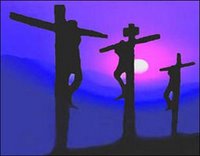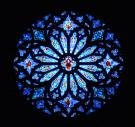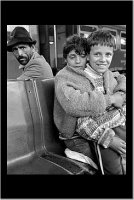Emotional Blackmale
 ‘Well, if he would only find a better job and earn more money, then I wouldn’t have to behave this way…’ It’s a fact of life that we’ve all experienced this type of deprecating rationalisation, whether through providing pastoral counselling, or simply by listening to friends, and Heaven forbid, even possibly through our own voices.
‘Well, if he would only find a better job and earn more money, then I wouldn’t have to behave this way…’ It’s a fact of life that we’ve all experienced this type of deprecating rationalisation, whether through providing pastoral counselling, or simply by listening to friends, and Heaven forbid, even possibly through our own voices.
People who use the ‘If you...then I’ kind of argument always know what’s right, what will set the world right, and their thinly veiled threat really says ‘If you don’t conform to my image of what is right, regardless of whether my own actions might be part of the problem, then I shall reek havoc upon you until you acquiesce.’
On the domestic front these are the people who are quite clear about what their marriage needs and if only their spouse had the good sense to see it their way, all would be well. It would be a betrayal of principle not to argue their point, spineless not to insist on the rightness of their cause. So they graciously and lovingly seek validation and clarification from others. All you have to do is to follow this policy, make this declaration, drop or adopt this particular idea.
Whatever’s wrong is your fault. You are the aggressive one, whose policies, beliefs and behaviours, are causing disruption to a marriage, dividing churches, and delaying peace in war-torn countries.
Every now and then you get a sudden insight into this common form of emotional blackmail, for that’s what it is. If you want the war to continue, if you want the marriage to end - if you really want to destroy the Church - the strategy is to claim, and indeed to believe, that far from making demands or being difficult, you’ve simply been forced into your position by the other’s intransigence. In psychology this is called passive aggression. In theology it is called the sin of presumption -because we presume our own innocence rather than seeking the judgment of God.
It is, in fact, a thoroughly aggressive way to behave. It is attempting to force an issue by emotional violence. We don’t always recognise the violence because we live in a society where manipulation to get our way is often preferred to painstaking negotiation.
As our society moves further away from the Christian values of self-restraint and respect for others, I fear we will have to put up with more and more of these tantrums, even from our elected leaders.
Speaking of tantrums reminds me of the terrible threats of Violet Elizabeth Bott in the ‘William’ books. Violet Elizabeth Bott was a very properly brought up little girl. But when she didn’t get her own way she had an unfailing weapon. She would cry: ‘I’ll thkweam and thkweam and thkweam until I’m thick’. I don’t think she ever was actually sick, but everyone was so terrified that she might be that they rushed to placate her.
Presumption is a sin that comes from weakness, from a failure to deal with reality. The answer is not to placate it but to stand up to it and make it show its true face.
.
Lord God, we pray for you to deepen our hunger for a world at peace, in which there is justice for all humankind and care for the whole creation. Teach us the imperfections of our understanding and lead us in the way of your Son Jesus Christ to worship in spirit and in truth. Amen.













